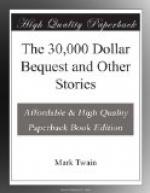If I had a phrase-book of a really satisfactory sort I would study it, and not give all my free time to undictionarial readings, but there is no such work on the market. The existing phrase-books are inadequate. They are well enough as far as they go, but when you fall down and skin your leg they don’t tell you what to say.
ITALIAN WITH GRAMMAR
I found that a person of large intelligence could read this beautiful language with considerable facility without a dictionary, but I presently found that to such a parson a grammar could be of use at times. It is because, if he does not know the WERE’S and the WAS’S and the MAYBE’S and the has-BEENS’S apart, confusions and uncertainties can arise. He can get the idea that a thing is going to happen next week when the truth is that it has already happened week before last. Even more previously, sometimes. Examination and inquiry showed me that the adjectives and such things were frank and fair-minded and straightforward, and did not shuffle; it was the Verb that mixed the hands, it was the Verb that lacked stability, it was the Verb that had no permanent opinion about anything, it was the Verb that was always dodging the issue and putting out the light and making all the trouble.
Further examination, further inquiry, further reflection, confirmed this judgment, and established beyond peradventure the fact that the Verb was the storm-center. This discovery made plain the right and wise course to pursue in order to acquire certainty and exactness in understanding the statements which the newspaper was daily endeavoring to convey to me: I must catch a Verb and tame it. I must find out its ways, I must spot its eccentricities, I must penetrate its disguises, I must intelligently foresee and forecast at least the commoner of the dodges it was likely to try upon a stranger in given circumstances, I must get in on its main shifts and head them off, I must learn its game and play the limit.




